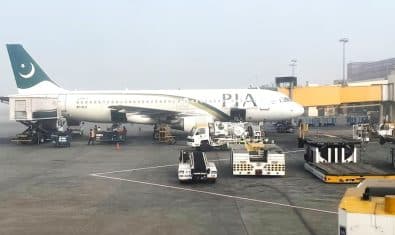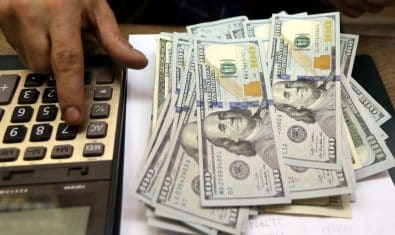Pakistan finds itself in deep economic malaise which could further worsen according to Economic Analyst Shahid Mehmood.
In a series of tweets the analyst shed light on some of the recent happenings to get a sense of where Pakistan currently stands given the political uncertainty and its impact on the country’s precarious economic situation.
THREAD- WHERE IS PAKISTAN’S ECONOMY HEADED IN COMING DAYS- Given the political uncertainties, and the recent end of PTI Govt., it would be convenient (and needed) to get a sense of where the economy is headed 1/n
— Shahid Mehmood (@ShahidMohmand79) April 6, 2022
The analyst noted, “In the past 2 weeks, $4.4 billion were rescheduled on Pakistan’s request ($2.4 billion by China, and $2 billion by UAE). Loan rescheduling indicates a country’s inability to pay on time. Read this with the widening trade gap that stood at above $30 billion in the first 9 months of the ongoing fiscal year. Moreover, as uncertainty gripped Pakistan over the last few months, money started flowing out of Pakistan. In March, reports suggest a net amount of billions of dollars was taken out by investors. We’ll probably see more outflows in the coming days. Last week, the rupee lost 7 units against the dollar, which translated into debt stock rising by Rs. 560 billion because every unit loss inflicts more debt to the tune of Rs. 80 billion or more”.
He remarked that this comes in the backdrop of recently released figures showing public debt at Rs. 42.76 trillion by the end of February. “Given our fiscal predicament, it’s not going to come down. On the domestic front, the ‘relief package’ is burning a serious hole in the government’s already troubled finances,” he said.
Reportedly, OGRA told the Finance Division that it’s unsustainable since the subsidy on petroleum products is costing Rs. 63 billion per day. Therefore, they recommended ending subsidy and pricing petrol at Rs. 213 per liter as uncertainty perpetuates.
Resultantly, it becomes a snowballing effect, with spillovers ranging from internal and external issues. Our creditworthiness and reliability in international markets are nothing to cheer about, further dampened by recent political events.
Mehmood explained that as “dollars flow out of Pakistan, threats to our debt are rising. The asking bid for Pakistan’s Eurobond climbed above 15 percent, compared to 8 percent a few months ago, and the treasuries at home have breached the 13 percent mark”.
It just so happens that everyone, within and outside, watches these developments with interest, and the outcomes are not pretty. National Power Control Centre (NPCC), for example, has warned of severe fuel shortages in the coming days, which will affect electricity production. That’s because the fuel suppliers, mostly foreign, are quite wary of Pakistan’s paying capacity as dollars flow out and we only have two months of reserves left. So, they would hesitate to supply fuel.
Similarly, think about other stuff that’s necessary for the Pakistani economy. Medicines, for example, use 95 percent imported APIs for production. Another botched-up refund policy means that the pharma industry remains unpaid, which means they won’t be able to pay suppliers, which means suppliers would stop supply, thus creating yet another shortage of critically needed medicines.
Similarly, hospitals have stopped treating people on Sehat Cards because payments to vendors haven’t been made for a month or two now. The probability is that the money was diverted to fund subsidies. Also, as uncertainty increases, so does smuggling into and outside of the country. As food inflation has galloped with little inclination to stop, imports have become more problematic. Hoarding will kick in (if it already hasn’t).
According to Mehmood, this will encourage smuggling, especially of cheaper stuff. The smuggling of cheap Iranian oil and cooking oil has jumped manifold as uncertainty has grown. It is but natural that a major portion of the population will prefer cheaper, imported varieties as wages haven’t kept up pace with food inflation.
While the dust settles down, Pakistan would have lost some portion of its expected GDP growth rate. Overall, total debt and liabilities would hit a new record high, and Pakistan could have more precarious finances than before. One outcome of the present situation, when it does assume some proportion of normality, is that the aggregate market clearance equilibrium would settle at higher nominal rates. This essentially means that from dollar to food prices, everything will be priced higher.
He adds, then there are other outcomes, like Public Sector Development Program (PSDP) expenses which will be significantly curtailed. And the shadow/informal economy would grow accompanied by growth in currency in circulation (as people run for liquidity and safety). Mehmood forecasts “more indirect/regressive taxes as the next government tries to plug the gaping fiscal hole that keeps getting wider”.
Mehmood explained, “the ask on Pakistani government securities (external and internal) is likely to remain higher in the short run unless the risk profile improves drastically. This will mean that the interest payment on domestic plus external debt, already comfortably above Rs. 2 trillion yearly, would be on an upward trajectory”.
The IMF program would resume, but under tougher circumstances, so expect more hikes in petrol, electricity, gas, and other utility prices, which sits nicely with the upper prediction of the economy towards a higher-priced clearing equilibrium. Also expect the government to keep expenses at par by resorting to a higher money supply, which will ultimately end up sustaining higher inflation in the future.
The current account deficit would most likely be low, as the GDP rate lessens and other issues (like payments to vendors) kick in, he wrote, adding that the pace of imports is likely to slow down. But do notice that the improving current account depends heavily on the assumption that our biggest exporters (U.S. and EU) will ignore our recent diatribes against their alleged involvement in Pakistan’s affairs. If God forbid, they decide to teach us a lesson (e.g. canceling GSP Plus), then we would be staring at a “deep abyss”.
All in all, without going into further details that are beyond the scope of tweet threads, there is a good probability of tougher times ahead.





















